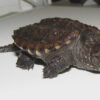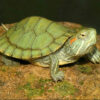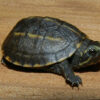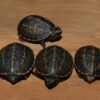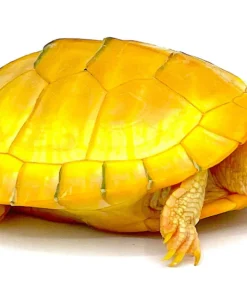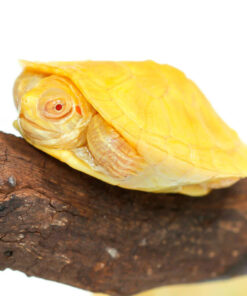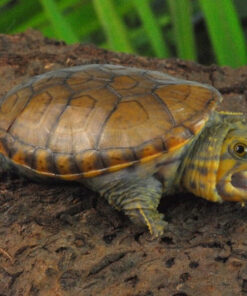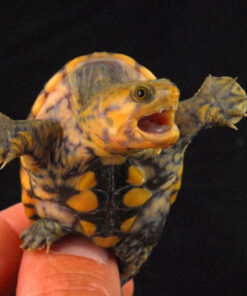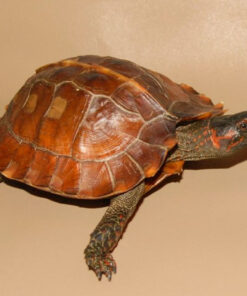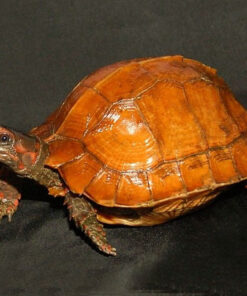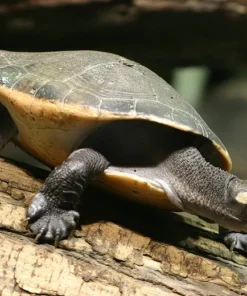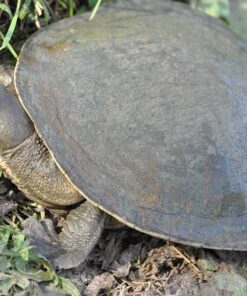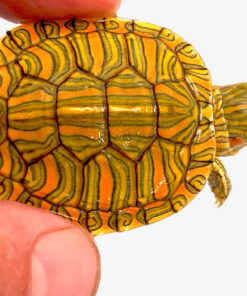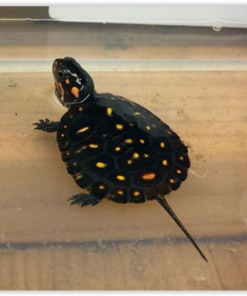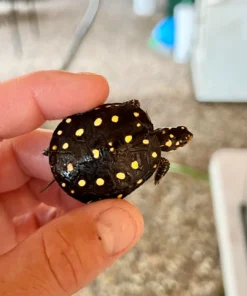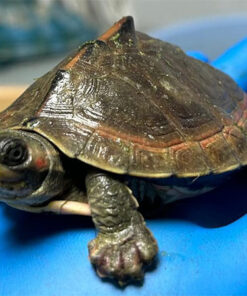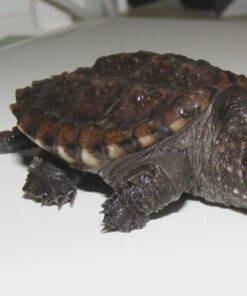$199.99
Discover the unique Florida Mud Turtle, a small species with an oversized head. Buy captive bred Kinosternon steindachneri online.
Category: TURTLES FOR SALE
Florida Mud Turtle for Sale: A Guide to Owning and Caring for This Small Aquatic Turtle
If you’re looking for a small, low-maintenance turtle that can easily fit into most home setups, the Florida Mud Turtle (Kinosternon steindachneri) might just be the perfect choice. Native to the southeastern United States, particularly in Florida, these turtles are hardy, easy to care for, and relatively peaceful, making them an excellent choice for both beginners and experienced reptile owners alike. In this comprehensive guide, we’ll explore everything you need to know about finding a Florida Mud Turtle for sale, including care tips, habitat setup, diet, and the joys of owning a Florida Mud Turtle baby.
Why Choose a Florida Mud Turtle?
Florida Mud Turtles are among the smallest turtle species, rarely growing beyond 4 to 5 inches in length. Their compact size, combined with their hardy nature, makes them an ideal choice for anyone looking for a smaller aquatic pet. Whether you live in an apartment or have limited space, a Florida Mud Turtle is easy to accommodate without requiring a massive aquarium.
Despite their small size, Florida Mud Turtles are full of character. They are curious, active, and can live up to 20 years with the right care. Their docile temperament also makes them a good choice for homes with children or individuals new to reptile ownership. Unlike some more aggressive species, Florida Mud Turtles are relatively calm and won’t usually nip or bite unless threatened.
Where to Find a Florida Mud Turtle for Sale
When searching for a Florida Mud Turtle for sale, it’s essential to source your pet from a reputable breeder or seller. Like many reptiles, captive-bred turtles are generally healthier, easier to care for, and more adaptable to new environments than wild-caught ones. Reptile expos, specialty breeders, and trusted online reptile stores are all excellent places to start your search.
Florida Mud Turtle Baby: A Popular Choice
Many first-time turtle owners opt to purchase a Florida Mud Turtle baby. Baby turtles are not only adorable but are also more adaptable to their new environment, making them easier to care for in captivity. However, it’s essential to ensure that you’re purchasing a healthy baby turtle from a knowledgeable breeder. When examining potential baby turtles, look for bright, clear eyes, active movement, and smooth, healthy-looking skin and shells.
A Florida Mud Turtle baby is generally more affordable than an adult turtle, with prices ranging from $50 to $150 depending on the breeder and availability. Buying a baby turtle allows you to watch it grow and adapt to its new surroundings, creating a unique bond between you and your new pet.
Florida Mud Turtle Habitat Requirements
Before bringing home your new Florida Mud Turtle, you’ll need to prepare its habitat to ensure it thrives in captivity. While these turtles are semi-aquatic, they spend a significant amount of time on land, which means their enclosure needs to accommodate both water and land areas.
Tank Size and Setup
A Florida Mud Turtle requires a balanced environment that provides both water for swimming and land for basking and resting. For a single adult turtle, a 40-gallon tank is usually sufficient, but bigger is always better, especially if you plan on keeping multiple turtles. For a baby Florida Mud Turtle, a smaller tank can be used initially, but as the turtle grows, you’ll need to upgrade the size of its enclosure.
The water in the tank should be shallow enough for the turtle to swim comfortably without struggling. Florida Mud Turtles are not the strongest swimmers, so keeping the water depth between 6 to 10 inches is ideal. The water should also be kept clean and well-filtered, as poor water quality can lead to health problems. A submersible or canister filter is recommended for maintaining a healthy aquatic environment.
Land Area and Substrate
In addition to a water section, Florida Mud Turtles need a land area where they can rest and bask. You can use rocks, driftwood, or a specially designed turtle dock to create an elevated space where the turtle can climb out of the water. This basking area should be equipped with a UVB light to help the turtle regulate its body temperature and absorb necessary vitamins, such as vitamin D3, which is essential for shell and bone health.
As for the substrate, a mixture of smooth gravel or river rocks can be used in the water section, while the land area can be lined with a natural substrate such as cypress mulch, sphagnum moss, or a mix of soil and sand. These turtles like to burrow occasionally, so providing a soft substrate on the land will encourage natural behaviors.
Temperature and Lighting
Maintaining proper temperatures is critical to keeping your Florida Mud Turtle healthy. The water temperature should be kept between 75°F and 80°F, with a basking spot that reaches around 85°F to 90°F. This temperature gradient will allow the turtle to move between water and land to regulate its body heat.
UVB lighting is essential for your turtle’s health, as it aids in calcium absorption and prevents metabolic bone disease. In addition to a UVB bulb, you’ll need a heat lamp over the basking area to provide the necessary warmth. These lights should be kept on for 10 to 12 hours per day to mimic the turtle’s natural day-night cycle.
Diet and Feeding: What to Feed Your Florida Mud Turtle
Florida Mud Turtles are omnivores, which means their diet should include both animal and plant matter. In the wild, these turtles feed on a variety of small invertebrates, fish, amphibians, and aquatic vegetation. In captivity, it’s important to replicate this varied diet to ensure they receive the proper nutrition.
Feeding a Florida Mud Turtle Baby
If you’re raising a Florida Mud Turtle baby, it’s important to start them on a balanced diet from a young age. Baby turtles require more protein than adults, so their diet should consist primarily of small insects, worms, and commercial turtle pellets specifically formulated for hatchlings.
Offer baby turtles small portions that they can easily manage, such as finely chopped earthworms, bloodworms, or commercially available reptile food. As they grow, you can introduce them to larger pieces of food and more variety, including small fish and shrimp.
Adult Florida Mud Turtle Diet
As your Florida Mud Turtle grows, its diet will expand to include a broader range of foods. You can feed adult turtles a mixture of:Insects (crickets, mealworms, earthworms).Aquatic invertebrates (snails, shrimp) Small fish Commercial turtle pellets Leafy greens (dandelion greens, romaine lettuce) Aquatic plants (duckweed, water lettuce)
It’s important to avoid feeding your turtle foods that are too high in fat or protein, such as feeder fish like goldfish, as they can cause health problems over time. Providing a balanced diet with occasional supplements, such as calcium, will ensure your turtle remains healthy and happy.
Turtles should be fed every two to three days, depending on their age and activity level. Be sure to remove any uneaten food from the tank to prevent it from contaminating the water.
Health and Lifespan: Caring for Your Florida Mud Turtle
Florida Mud Turtles are generally hardy and resistant to many common reptile health problems, but they still require proper care to prevent illness. With the right environment, diet, and maintenance, your turtle can live a long and healthy life.
Common Health Issues
Some of the most common health problems seen in Florida Mud Turtles include:
Shell rot: This is a bacterial or fungal infection that affects the turtle’s shell, often caused by poor water quality or unsanitary conditions. Regular water changes and a clean tank can help prevent shell rot.
Respiratory infections: Like many reptiles, turtles can develop respiratory issues if they are exposed to cold temperatures or drafts. Signs of a respiratory infection include wheezing, lethargy, and nasal discharge. If you notice these symptoms, consult a reptile veterinarian.
Vitamin deficiencies: Without proper UVB lighting or a balanced diet, turtles can suffer from vitamin deficiencies, particularly a lack of vitamin D3. This can lead to metabolic bone disease, which affects the turtle’s shell and bones.
Longevity
With proper care, Florida Mud Turtles can live for up to 20 years or more in captivity. This makes them a long-term commitment, so it’s important to be fully prepared for the responsibility of owning a turtle before purchasing one.
Regular check-ups with a reptile veterinarian, maintaining a clean and stable environment, and providing a healthy diet will all contribute to the longevity of your Florida Mud Turtle.
The Joys of Owning a Florida Mud Turtle
Florida Mud Turtles make excellent pets for both beginners and experienced reptile enthusiasts. Their small size, low-maintenance care needs, and hardy nature make them a perfect choice for those looking for a manageable aquatic turtle species. Despite their relatively easy care requirements, Florida Mud Turtles are full of personality and provide endless enjoyment for their owners.
Watching your Florida Mud Turtle baby grow into a healthy adult, observing its curious behavior, and creating a naturalistic habitat that replicates its native environment can be a rewarding experience. Whether you’re keeping a single turtle or multiple turtles, these reptiles will bring a touch of nature into your home.
Conclusion: Finding Your Florida Mud Turtle for Sale
If you’re ready to add a Florida Mud Turtle to your collection, it’s time to start searching for a reputable breeder or seller. Whether you’re interested in a Florida Mud Turtle baby or an adult, these turtles are an excellent choice for any reptile lover looking for a manageable and fascinating aquatic pet.
Take your time to research the care requirements, set up the appropriate habitat, and ensure you’re fully prepared to provide a loving home for your new pet. With the right care, your
Related products
TURTLES FOR SALE
$249.99
TURTLES FOR SALE
$199.99
Sale!
TURTLES FOR SALE
Sale!
TURTLES FOR SALE
TURTLES FOR SALE
Baby Indian Brown Roofed Turtle for Sale | #1 Best exotic Reptiles
$349.99
TURTLES FOR SALE
$149.99

